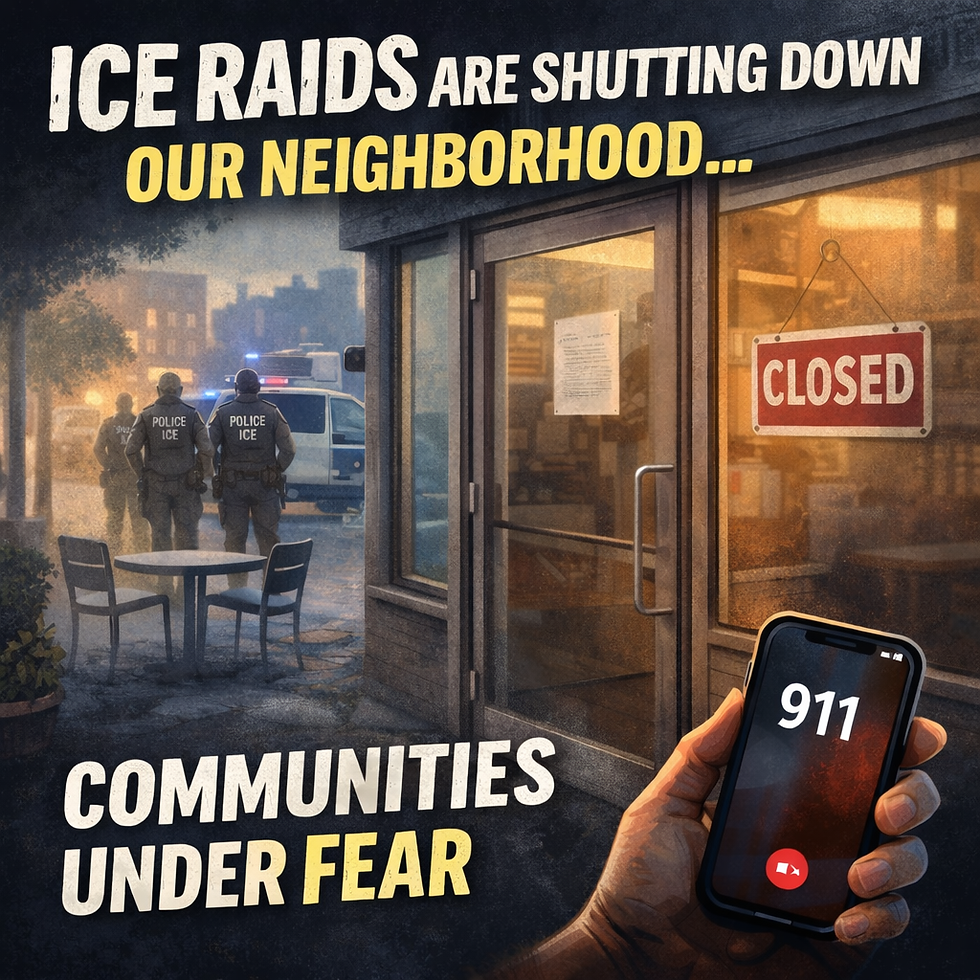Six Months In: How America Feels Under Trump’s Return
- Jeremy Bratcher

- Jun 17, 2025
- 3 min read
Updated: Jun 19, 2025
Six months into Donald Trump’s return to the presidency, America doesn’t just look different. It feels different. And that feeling is hard to ignore. According to a recent APA survey, 67 percent of Americans report anxiety about current events, and nearly two-thirds are worried about their family’s safety and finances.¹ These aren’t just numbers. They reflect a deeper emotional current: Americans are stuck in survival mode.
This isn’t entirely surprising. The 2024 election reawakened familiar tensions, and for many, that tension never really went away. We are not just reacting to politics. We are reacting from within nervous systems conditioned by years of fear, instability, and cultural volatility.
Politics as Threat Theater
Since the January inauguration, the emotional temperature of the country has risen. ICE raids returned to national headlines in cities like Los Angeles, where immigrant communities experienced a renewed sense of surveillance and disruption.² In some areas, small businesses reportedly lost up to $7,000 per week due to customer withdrawal and community fear.³ Schools also saw absenteeism spike as children stayed home in anticipation of enforcement action.
These incidents go far beyond policy. They create a climate of chronic uncertainty. A 2025 brief from Charlie Health reported that 75 percent of young adults surveyed said the political climate was actively harming their mental health.⁴ Families stopped going out, communities avoided public events, and social trust eroded further. What we are seeing isn’t just political polarization—it’s psychological fragmentation.
Winners, Losers, and the Economics of Anxiety
The 2024 campaign promised stability. But so far, economic stress remains high. Forty percent of Americans worry about job security, and 61 percent report financial stress related to basic expenses.⁵ Add to that the emotional weight carried by immigrants, LGBTQ+ individuals, and racial minorities, and it becomes clear: safety is not evenly distributed.
Mental health professionals describe this moment as one of "sustained anticipatory anxiety."⁶ The trauma isn't only in what happens—it’s in what might happen next. And many Americans are living with that uncertainty every day.
Trauma Doesn’t Belong to One Party
This kind of limbic reactivity isn't partisan. Roughly half of American adults report that politics has caused them sleep problems, stress-related health issues, and intrusive thoughts.⁷ Even among disengaged voters, 73 percent say they are emotionally exhausted by political news.⁸ Whether Left or Right, progressive or conservative, people are not just debating—they are defending. Many are trying to protect their sense of belonging, identity, or safety.
We are not just a divided country. We are an emotionally dysregulated one.
Where Hope Can Begin
If you’re tired, anxious, overwhelmed, or numb, you are not alone—and you are not broken. You are responding to an environment that has trained people to live in stress. But we do not have to stay there. Healing begins when we choose presence over panic, courage over cynicism, and connection over reaction.
The future of America doesn’t hinge only on laws and elections. It hinges on whether we can create spaces that regulate rather than inflame. Whether churches, families, schools, and community leaders can foster calm and grounded resilience.
Six months in, we are not destroyed. But we are still dysregulated. And no president—whether praised or feared—can heal what only a people committed to peace can restore.
Explore the full emotional landscape of modern America in my book,
The Limbic States of America: How Trauma, Fear and Survival Hijacked America's Last Decade.
From trauma theory to cultural analysis, from digital triggers to spiritual resilience, this book is a roadmap to understanding why we feel the way we do—and how we move forward.
Available now in paperback and ebook jeremykbratcher.online
or search “Limbic States of America” on Amazon
Footnotes
American Psychiatric Association. “Stress in America: January 2025 Report.” https://www.psychiatry.org
Los Angeles Times. “ICE Activity Returns to LA, Families Fear Detention.” March 2025.
NBC News. “ICE Raids Cause $7,000 Weekly Business Drop in LA Neighborhood.” March 2025.
Charlie Health. “The Mental Health Toll of Political Fear.” January 2025. https://www.charliehealth.com
APA & Gallup Poll. “Financial Stress in the U.S.” February 2025.
National Alliance on Mental Illness (NAMI). “Living Under Uncertainty.” April 2025.
Political Psychology Journal. “The Health Effects of Political Stress.” December 2024.
Pew Research Center. “Most Americans Are Exhausted by Politics.” March 2025.







Comments